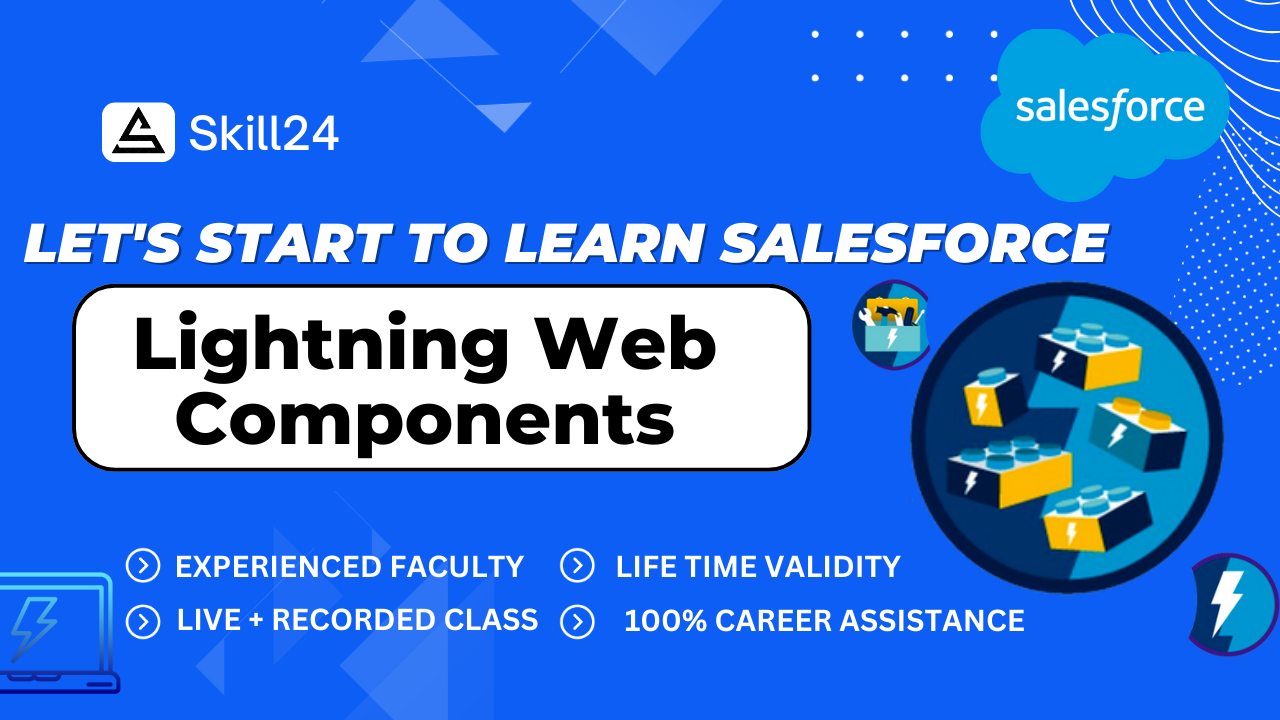Subtotal: $318.00

As businesses are getting more digitized, the demand for tech experts continues to rise. And with a base salary of 1.6 million, the role of a trained Salesforce LWC architect has never been more promising. However, breaking into this field requires specialized knowledge and expertise, which is where our comprehensive Salesforce lightning developer training program comes in.
Our Salesforce LWC training program is designed to equip you with the necessary skills to develop on the Salesforce Platform. We'll teach you everything from the LWC and Aura framework to custom elements, shadow DOM, and the tag. With this knowledge, you can develop single-page web applications that provide an end-to-end experience on the Salesforce platform. But that's not all. Our training program also includes practical experience that will give you the confidence to ace the Salesforce JavaScript Developer I exam in one go. The best part? Our training program is available both online and in-person, so no matter where you are in the world, you can learn the Salesforce LWC course and gain a global perspective with students from all over the world, including India, UK, Canada, USA, Singapore, UAE, and Australia. But wait, there's more! We're the only training institute with an in-house certification exam centre, providing unparalleled opportunities for you to become job-ready and pass technical interviews easily.
The LWC Salesforce course focuses on teaching developers how to build Lightning Web Components (LWC) using the Salesforce platform. LWC is a modern framework for developing web applications on Salesforce, providing a streamlined and efficient development experience. Here are some key points that are typically covered in an LWC Salesforce course:
Introduction to Lightning Web Components: The course begins with an overview of Lightning Web Components, explaining their architecture, benefits, and how they fit into the Salesforce ecosystem.
LWC Development Basics: Participants learn the fundamental concepts of LWC development, including component structure, HTML templating, JavaScript controllers, and CSS styling.
Data Binding and Interactions: The course covers how to handle data binding between components, enabling data sharing and communication. Participants also learn how to handle events and user interactions in LWC.
Component Composition and Reusability: Students explore techniques for composing LWC components and creating reusable modules. This includes using slots, parent-child component relationships, and passing data between components.
Apex Integration: The course covers integrating LWC with Apex, Salesforce's server-side programming language. Participants learn how to invoke Apex methods from LWC and handle server responses.
Lightning Data Service: Participants learn about Lightning Data Service, which provides a declarative way to access and manipulate Salesforce data in LWC. Topics covered include using base components, retrieving and modifying records, and handling errors.
Lightning App Builder: The course covers how to use Lightning App Builder to create custom Lightning pages and assemble LWC components into a cohesive user interface. Participants learn how to design and customize Lightning pages using the drag-and-drop interface.
Navigation and Routing: Participants learn how to handle navigation and routing within an LWC application. This includes using the Lightning Navigation service to navigate between different pages and passing parameters in URLs.
Styling and Branding: The course covers techniques for styling LWC components using CSS. Participants learn how to apply custom styles, use CSS frameworks, and create a consistent visual design for their applications.
Testing and Debugging: Participants learn best practices for testing and debugging LWC components. This includes using the Salesforce Developer Console, LWC test utilities, and writing unit tests to ensure component functionality and reliability.
Deployment and Packaging: The course covers the process of deploying LWC components to different environments and packaging them for distribution. Participants learn how to deploy components using the Salesforce CLI and package them for easy installation in other Salesforce orgs.
Performance Optimization: Participants learn techniques for optimizing the performance of LWC applications. This includes reducing network requests, lazy loading components, and using caching strategies to enhance user experience.
Modern Web Development: LWC is a modern web component framework that follows the latest web standards. By learning LWC, you gain valuable skills in modern web development, including component-based architecture, JavaScript, HTML, and CSS. These skills are transferable and can be applied to other web development projects beyond Salesforce.
Salesforce Ecosystem: Salesforce is a leading customer relationship management (CRM) platform used by businesses worldwide. LWC is the preferred framework for building user interfaces on Salesforce. By learning LWC, you gain expertise in a technology that is in high demand within the Salesforce ecosystem, making you more valuable as a developer.
Improved Developer Productivity: LWC simplifies the development process by providing a streamlined and efficient development experience. With LWC, you can build rich, interactive user interfaces with less code and effort. By taking an LWC Salesforce course, you can learn the best practices and techniques that will help you become more productive and efficient in your development work.
Customization and Extensibility: Salesforce allows extensive customization and extension of its platform to meet specific business needs. By learning LWC, you can create custom components and user interfaces tailored to your organization's requirements. This empowers you to build highly flexible and adaptable solutions on the Salesforce platform.
Integration with Salesforce Features: LWC seamlessly integrates with various Salesforce features and services. With LWC, you can leverage the power of Salesforce's data model, security, authentication, and other platform services. By learning LWC, you can harness these capabilities to build robust and feature-rich applications that fully leverage the Salesforce platform.
Career Opportunities: The demand for skilled Salesforce developers is consistently high. By acquiring expertise in LWC, you position yourself for a wide range of career opportunities within the Salesforce ecosystem. Whether you are looking to work as an in-house developer, a consultant, or a freelancer, having LWC skills can open doors to exciting job prospects.
Continuous Learning and Professional Growth: As technology evolves, it's essential to stay updated with the latest tools and frameworks. By taking an LWC Salesforce course, you invest in your continuous learning and professional growth. You stay current with the latest trends in web development and enhance your skill set, which can lead to new opportunities and advancements in your career.
Overall, taking an LWC Salesforce course can provide you with the skills, knowledge, and opportunities to become a proficient Salesforce developer and enhance your career prospects in the Salesforce ecosystem.
The LWC Salesforce course is designed for individuals who are interested in becoming proficient in building Lightning Web Components (LWC) on the Salesforce platform. Here are the types of individuals who can benefit from taking an LWC Salesforce course:
Developers: If you are a developer looking to expand your skill set and specialize in Salesforce development, the LWC Salesforce course is a great fit for you. Whether you have prior experience with Salesforce or are new to the platform, the course will teach you the concepts and techniques necessary to build robust and scalable LWC applications.
Salesforce Administrators: Salesforce administrators who want to extend their capabilities beyond declarative customization can benefit from learning LWC. By taking the course, administrators can gain the skills to create custom Lightning components and enhance the user experience of their Salesforce orgs.
Web Developers: If you have a background in web development and want to leverage your skills in the Salesforce ecosystem, the LWC Salesforce course can be a valuable learning opportunity. The course will help you understand how to apply your existing knowledge of HTML, CSS, and JavaScript to build modern web applications on the Salesforce platform.
Salesforce Consultants: Salesforce consultants who want to provide comprehensive solutions to their clients can benefit from learning LWC. By gaining expertise in LWC development, consultants can offer custom component development, user interface design, and enhanced user experiences as part of their consulting services.
IT Professionals and System Integrators: Professionals working in the IT industry or system integrators involved in integrating Salesforce with other systems can benefit from learning LWC. LWC allows seamless integration with external systems and can be used to build sophisticated interfaces that connect different platforms.
Aspiring Salesforce Developers: If you are new to Salesforce development but have a passion for coding and want to start a career as a Salesforce developer, the LWC Salesforce course is an excellent starting point. It provides a solid foundation in LWC development and equips you with the skills needed to pursue a career in Salesforce development.
It's important to note that while prior programming experience is beneficial, individuals with different backgrounds and skill sets can also benefit from the LWC Salesforce course. The course is designed to cater to both beginners and experienced developers, providing the necessary guidance and resources to learn and apply LWC effectively.
| USER | TOP-RANKED PROGRAMS | HIRING PARTNER | BEST FACULTY |
| 25000+ | 10 | 250+ | 500+ |
We Assure You of Job Assistance at the End of the Program.
|
|
|
|
|
|
|
|
|
|
|
|
|
|
|
|
|
|
|
|
|
|
|
|
|

